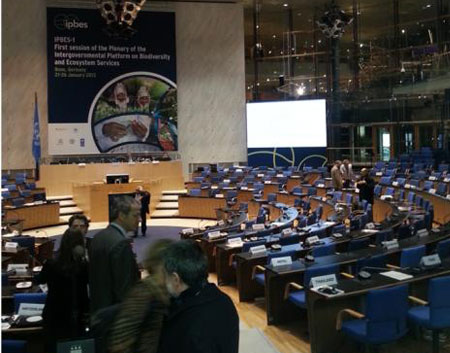When Einstein wisely endorsed the concept of a Four-dimensional Spacetime, he probably didn’t have in mind intergovernmental negotiations. But as IPBES proceeds, space and time clearly experience peculiar distortions.
Corridors and lobbies, I reckon, expand when needing to encompass rapidly-moving humans during overly-short intermissions. But suddenly time moves slowly again and the walls close on you when attending “Contact Groups” (these are the less formal and hence more effective ways of conducting discussions), where eternal negotiations take place. Take care, though: The non-linearity of spacetime implies that shifts in topics, or the inclusion or exclusion of critical texts, can occur so rapidly that one could easily miss an entire theme while blinking.
|
|
----------------------------
More on Day Four
Day four again began with a morning Stakeholder group meeting, where Stakeholders discussed preferred language for plenary documents describing the Stakeholder Engagement Strategy to confirm that all stakeholders will be involved from the beginning of the process of developing this strategy, as opposed to being only consulted after a draft strategy has been written by either the Secretariat or a small subset of stakeholder institutions (ICSU, IUCN).
When the Stakeholder Engagement Strategy was discussed in a contact group later in the day, text was agreed upon by governments that provided for wide involvement of stakeholders in developing this strategy. We look forward to this being approved by the full Plenary.
A selection of heads of delegation of stakeholders (ICSU, IUCN, SCB, Birdlife International, and a representative from the business sector) were given an audience with the EU to discuss our view on the dependence of the success of IPBES on full and effective participation by stakeholders both as advocates and users of information provided by the platform, and as providers of knowledge required by IPBES to do its work.
Meanwhile, contact groups continued work on Rules of Procedure, the Work Programme, the institutional arrangements and relationship of IPBES with the UN, and determining the final composition of the MEP as each region narrows their list of nominees. Contact groups continued late into the evening (10pm), with many major Rules of Procedure still without resolution, including rules for the admission of observers to the Plenary.
- Carolyn Lundquist
----------------------------------------------
|
|
“What are you doing outside?!” came to me the question while enjoying a short moment of rest. “They are dealing now with the Stakeholder Engagement Strategy!”
“How much did I miss?”, I ask. “They are discussing it already for a good hour.” Oops, I must have blinked for too long. Hallway expands, I commence a swift pace and enter the Plenary hall again.
Day four was allocated to at least three important themes from our perspective: Developing a Stakeholder Engagement Strategy, ensuring that strategy is mentioned and called for in the IPBES texts, but also receives dedicated budgets, and finally, ensuring that the MEP is provided with good (but not prescriptive) guidance for prioritizing requests.
A rough 14-hour day, lasting from 8:30 to 22:30, can be summarized by several achievements: First, a section of the Work Programme of IPBES for 2014-2018 now explicitly requests the development of a Stakeholder Engagement Strategy. More so, while we were concerned that the diversity of relevant stakeholders is not fully recognized, the final (or I should be more careful and say “current”) texts are even better than we were hoping for, and explicitly state that the development of the strategy will be conducted in a cooperative, publically open process. Good to know that we are not alone in our concerns, and even nicer to know that the consortium who meets up here knows its work so well.
Second, after a near-casual removal of a budget item which would have affected the work of IPBES with bodies outside the IPBES, we were happy to see that the item was brought back, and it seems that at the end of the day it is decided that there will be a dedicated person on “communication and outreach”, someone who could actively support stakeholder engagement.
Finally, we were somewhat concerned about the texts relating to prioritization of requests and particularly to some texts suggesting how the MEP should prioritize requests – e.g., giving higher priority to joint requests from governments. True, IPBES must respond to policy needs, but excellent requests could come from anyone. So, should we prescribe the MEP on how to prioritize? Having raised this question, a split second of discussions resulted in the astonishingly easy decision to completely remove two problematic paragraphs (- spacetime collapses for a split second, and resume a broad, slow expansion of happiness).
 |
|
IPBES delegates at the end of a long day at the Plenary |
We are getting drowsy, the quality of the texts diminishes, comments from the different delegates dwindle, spacetime expands to eternity and beyond. And finally: 22:30, the hammer hits the Chair’s table for the last time and the silhouettes of exhausted human-beings are allowed to progress, empty- eyed, speech-centre switched off, towards the exit.
Blog Posts from SCB's IPBES Delegation
SCB IPBES Resources
